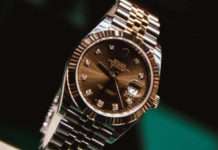- Last week, Mongabay revealed a massive illegal shark finning operation across the fleet of a major Chinese tuna fishing firm.
- The company, Dalian Ocean Fishing, mainly serves the Japanese market. Most of its tuna has gone to Japan’s Mitsubishi Corporation and its seafood trading arm, Toyo Reizo.
- While the general outlines of their partnership are well-documented, tracing specific tuna flows from individual fishing boats to Mitsubishi’s supply chain is impeded by the murky nature of the supply chain.
- Experts say this lack of transparency must be solved in order to prevent illegal fishing and labor abuses at sea.
Tuna is ubiquitous in Japan, from high-end sashimi to go-around sushi chains and every neighborhood grocery store. But despite tuna’s central place in Japanese food culture, few know what really happens on the fishing vessels that supply the country’s tuna market.
Last week, a Mongabay investigation revealed a massive illegal shark finning operation across the fleet of Dalian Ocean Fishing (DOF), which has claimed to be China’s largest supplier of sashimi-grade tuna to Japan, a top consumer. According to dozens of interviews with men who worked for the company between 2018 and 2020, its boats used banned gear to deliberately catch and illegally cut the fins off huge numbers of sharks on the high seas even as it caught tuna destined for Japan. The article followed an earlier exposé of widespread labor abuses across the same fleet.
Since DOF’s inception in 2000, the buyer of most of its tuna had been Japan’s Mitsubishi Corporation and its seafood arm, Toyo Reizo Co. Ltd. Mitsubishi said it suspended that relationship in mid-2020, when the deaths of four Indonesian deckhands from one of DOF’s boats made international headlines. However, the Japanese firm’s two decades as DOF’s most important business partner were critical to the rapid expansion of a fishing company that, former workers said, grew into a major human rights abuser and environmental criminal.
About half the tuna consumed in Japan is imported, according to the nation’s Fisheries Agency. While some is farmed, wild tuna caught by foreign fleets also helps satisfy demand, especially as Japan has scaled down its own distant-water tuna fleet from roughly 1,000 longline vessels in the 1970s to less than 200 today. China now has by far the world’s largest distant-water fleet, with thousands of boats.
Distant-water fishing is when boats fish outside their own country’s territorial waters. The practice is enabled by a system called transshipment at sea, in which refrigerated cargo ships, known as reefers, pick up fishing vessels’ catch on the open ocean. By the time a reefer laden with sashimi-grade tuna makes it to port in Japan, following up to 100 transshipments, it can be carrying many millions of dollars worth of fish, according to an individual with experience working on a reefer as an observer who requested anonymity. But while transshipment lets fishing vessels save on fuel, it also helps them conceal environmental and labor abuses, because they can remain at sea — and away from the prying eyes of law enforcement — for years at a time, without ever going to port.
Mitsubishi is one of the world’s biggest companies, ranking 41st in this year’s Fortune 500. But although the broad outlines of its partnership with DOF are well-documented, tracking tuna flows from specific DOF boats into the Japanese firm’s supply chain, and from there to consumers, proved extremely difficult due to the murkiness of the tuna supply chain. Experts say this lack of transparency, commonplace in the industry, must be improved in order to stop abuses and lawbreaking at sea.
The web of reefers
In order to understand where DOF’s tuna ended up, it was necessary to track the reefers its vessels transshipped with, which had inadvertently hidden both the deadly abuse of vulnerable deckhands and an industrial-scale shark finning scheme.
Japan’s Fisheries Agency has published a list of 18 reefers that frequently service its seafood market. A review of public records suggested at least five of those were chartered by a Mitsubishi subsidiary called MRS Corporation, and the conglomerate confirmed as much in an email. Toyo Reizo’s website also lists three of those reefers as used by the company: Tuna Queen, Tuna Princess and Lady Tuna.
DOF, meanwhile, owned and operated some 35 longline boats during the period our interviewees worked for the company. Mongabay tracked down and interviewed workers from around a third of them, and their testimonies indicated that illegal shark fishing and horrible living and working conditions were the norm across the fleet.
Satellite-tracking data from the online platform Global Fishing Watch (GFW), while at times incomplete because boats frequently turn off their transponders, showed that the Lady Tuna often “encountered” DOF vessels between 2018 and 2020, including several of those whose workers said labor abuses and large-scale shark finning had occurred on board.
An encounter, according to GFW, means two vessels were located next to each other, unmoving, for a few hours. An encounter at sea doesn’t necessarily mean tuna changed hands, because encounters are based only on location data, but the former observer said that “75-80% of encounters” were probably transshipments. In other instances, bait, fishing gear or food supplies would be moved from reefer to fishing vessel, but those deliveries were scheduled in advance: “The reefer isn’t operating like a floating 7-Eleven.”
Reliable data on reefer ownership and management can be hard to come by. For example, records held by the International Commission for the Conservation of Atlantic Tunas (ICCAT), the treaty organization that regulates Atlantic Ocean tuna fisheries, sometimes listed reefers as being “operated by” or “chartered to” MRS even when other databases didn’t.
Most of the reefers that service Japan were flagged to Panama, a “flag of convenience” that experts say often lets shipowners benefit from lax oversight and can help hide the identity of a vessel’s true owner. The Japan reefers’ on-paper owners were sometimes located in countries such as Singapore or, again, Panama.
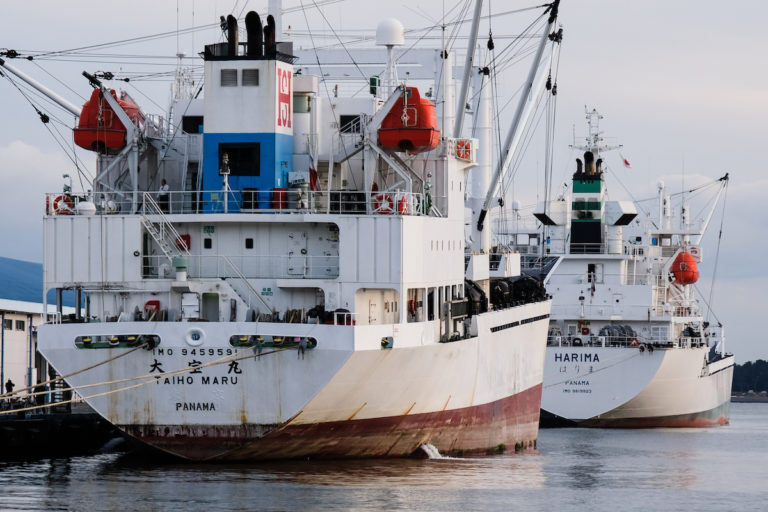
This Russian nesting doll method of leasing and subleasing vessels could be seen across maritime operations, according to the abovementioned former observer: “Work on all boats can be dangerous, so having various companies limits liability, and it’s cheaper that way too.”
In some cases, DOF vessels encountered reefers operated by what appeared to be other shipping companies; once laden with tuna, those reefers would head back to Japan as well as other parts of East Asia. Even the MRS reefers would stop at ports outside Japan too, potentially dropping off fish.
Despite the major data gaps, we were able to trace one DOF transshipment to Japan. Although many calls to management companies of reefers with DOF encounters were met with a refusal to answer questions, a representative at one such company, Hayama Shipping, said a transshipment had taken place on Aug. 15, 2019, from DOF’s Long Xing 629 to the reefer Taiho Maru, which then went to Shimizu Port in Japan.
The Long Xing 629 is one of DOF’s most notorious boats, with five Indonesian deckhands who fell ill and died in 2019 and 2020. And the vessel illegally harvested around 743 kilograms (1,638 pounds) of dried shark fin, equivalent to an estimated 4,583 individual sharks, during a 13-month stretch, a former worker told Mongabay. Photos smuggled off the boat showed that some of the fins belonged to critically endangered oceanic whitetip sharks (Carcharhinus longimanus), which are illegal to retain under any circumstances. Like other DOF boats, the Long Xing 629 used a banned gear setup to illegally catch many thousands of sharks.
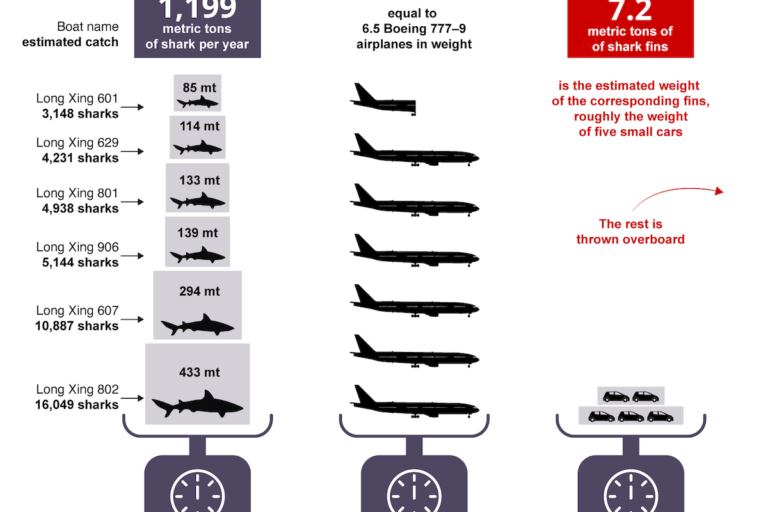
Mitsubishi would neither confirm nor deny that it had purchased the Long Xing 629’s tuna via the Taiho Maru. In general, Mitsubishi declined to provide information about specific transshipments. But of the 18 DOF vessels accounted for by Mongabay’s investigations, at least nine had at least one encounter with a Japan-bound reefer — including four encounters with the Lady Tuna and three with the Ibuki, both chartered by MRS — during the periods said crew members were on board, according to location data on GFW. We also identified encounters between Japan-bound reefers and an additional eight DOF vessels from which we were unable to interview crew members.
Rusnata, a deckhand from another DOF boat, the Long Xing 607, specifically remembered offloading tuna onto the Lady Tuna. The transshipment stuck out in his mind because one of his fellow deckhands tried to escape by jumping onto the reefer during the tuna transfer. The incident, Rusnata told Mongabay, occurred around March 2019, by which time the Indonesian deckhands, who were being given poor food rations, dirty drinking water and made to work 18 hours a day or more, had demanded to be sent home, to no avail. GFW confirmed an encounter between the two vessels late that same month. “The captain of the collecting boat refused to take him since it was problematic,” Rusnata said. “He was told to jump back and return.”

In addition to the importers themselves, another organization able to grasp the majority of Japan’s tuna supply chain is the government’s Fisheries Agency. To ensure catch limits aren’t exceeded, all frozen tuna imports are recorded per fishing vessel via declarations submitted to the agency’s Tuna Fisheries Office. The declarations include the fishing vessel name and owner, the name of the vessel transporting it to Japan and who purchased it upon arrival.
In response to a freedom of information request regarding a couple of specific transshipments, the Fisheries Agency declined to disclose the documents because they “relate to specific transport and business agreements,” and their disclosure “could harm legitimate interests such as competitive position.”
The supply chain from importer to consumer is no less murky than the supply chain at sea. Our investigation could find no way for Japanese consumers to know whether they might have inadvertently purchased tuna caught by DOF. The customers of seafood distributors like Toyo Reizo, the Mitsubishi subsidiary, include restaurants, supermarkets and wholesalers. Once it entered Japan, DOF’s tuna could have gone anywhere.

In a short section on its website titled “Traceability,” Toyo Reizo notes that it records the path of each tuna, from production area to final vendor, and is able to “quickly and accurately” share product information. Mitsubishi confirmed that, at the time of sale, it informs customers of the relevant fishing vessel’s flag and which ocean the tuna was caught in; other information, such as the names of fishing boats, would be disclosed if requested by the customer.
Mitsubishi declined to answer who DOF’s tuna was sold to: “We are unable to answer questions regarding the content of individuals transactions, as it would violate our confidentiality with our clients.”
DOF’s largest customer
Despite the opacity of Japan’s imported tuna supply chain, draft documents for DOF’s unsuccessful 2014 attempt to go public on the Hong Kong Stock Exchange laid out its relationship with Mitsubishi in some detail.
The documents noted that while DOF sold tuna to both Japan and China, Mitsubishi was by far its biggest customer as well as its sole customer in Japan. They even said that in order to maintain its good working relationship with Mitsubishi, DOF would rebuff any offers from other Japanese importers.
“We have an established business relationship with Toyo Reizo of over 13 years,” the 2014 documents said, referring to the Mitsubishi subsidiary. “We derived revenue from sales to Toyo Reizo of RMB173.0 million [$26.8 million], RMB224.2 million [$35.5 million], and RMB274.3 million [$44.6 million] in 2011, 2012 and 2013, respectively, representing 80.4%, 73.9% and 72.0% of our total revenue for the same periods,” the documents said, using exchange rates for the respective years.
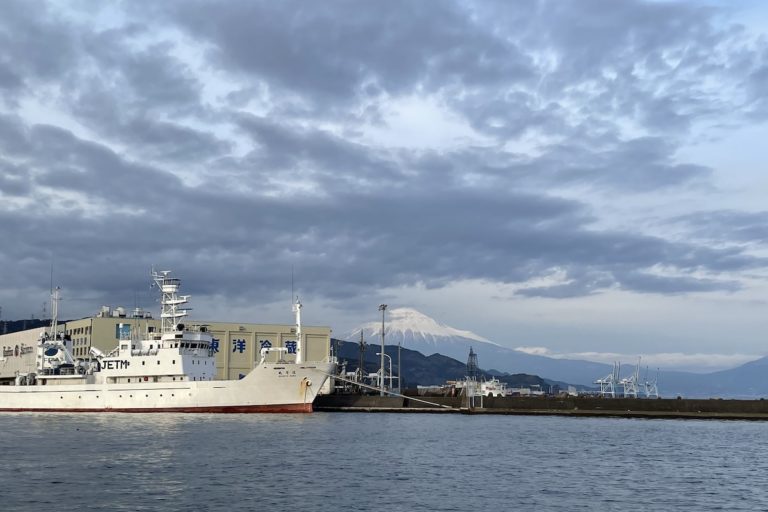
DOF was established in 2000. A “business relationship of over 13 years” means the company had been selling tuna to Mitsubishi since practically its inception. In just the three-year period from 2011 to 2013, DOF’s revenue expanded drastically from this single customer. At the same time, between 2012 and 2014, DOF used funds from international investors, attracted by the tuna firm’s business prospects, to triple the size of its fleet to 24 longline vessels. Many of those vessels went on to engage in the labor abuses and environmental crimes exposed by our investigations.
According to the 2014 documents, in 2013 DOF signed a memorandum of understanding with Mitsubishi and Toyo Reizo, agreeing that they would increase their purchase volume as DOF expanded its fleet, that the parties would hold regular visits and meetings to discuss the tuna market and that Toyo Reizo would train DOF captains and crew in tuna processing. A 2018 audit of DOF by a Chinese accounting firm also said its tuna was “mainly sold to Japan” and showed that the Japanese firm remained a key customer.
In response to questions about how it ensures human rights are protected in its supply chains, last year Mitsubishi said it implements “dialogue sessions” and, since 2017, “an annual questionnaire” for suppliers.
However, those measures failed to detect the abuses on its supplier’s fleet. Mitsubishi said it “remained unaware” of the labor abuses until the deaths of four Long Xing 629 deckhands were reported by news outlets in May 2020.

Earlier this year, Mitsubishi released new “Tuna Procurement Guidelines” to address forced labor and illegal, unreported and unregulated fishing — commonly referred to by the acronym IUU — in its supply chain. Its commitments include supporting more robust monitoring of transshipment activities as well as advocating “for fishing vessels to comply with international treaty requirements for observers to be on board longline fishing vessels, as well as to support increased boarding rates and stronger boarding management systems through electronic monitoring and other means.”
New measures the corporation promises to implement starting this year include external audits of tuna suppliers, holding workshops for suppliers on IUU fishing and human rights and considering avenues to cooperate with suppliers and other stakeholders to ensure a decent working environment on board tuna fishing vessels.
However, campaigners say the distant-water fishing industry as a whole has been unwilling to do away with transshipment at sea entirely, despite calls from NGOs to do so.
“Companies basically say if there’s no transshipment at sea, they won’t be able to operate,” Andy Shen, former Greenpeace senior oceans adviser, said in an interview with Mongabay while he was still with the group. “Most fishing vessels, especially longliners, don’t return to port for months or even years on end. That’s a major risk factor, because there’s no one watching out for the crews, and no way for them to leave.”
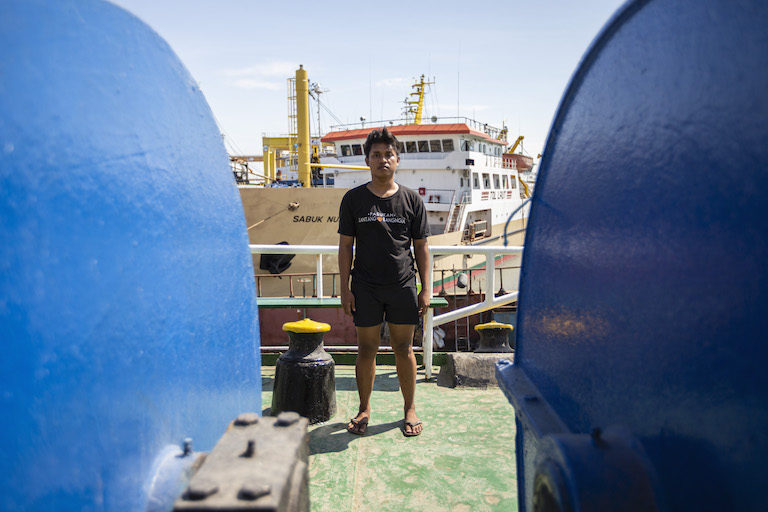
Japan: No legal framework to ban forced labor products
In May 2021, the U.S. Customs and Border Protection (CBP) banned the import of tuna and other seafood products caught by DOF “based on information that reasonably indicates the use of forced labor in the entity’s fishing operations.”
DOF’s main customers, however, have always been in East Asia, first and foremost Japan. However, it’s not so easy for Japan to implement a similar ban on tuna linked with forced labor.
“Japan currently does not have the same kind of legal system in place as the U.S. to prohibit the import of goods manufactured by forced labor in general,” Kohei Ito, deputy head in charge of resource management in the Fisheries Agency’s International Affairs Division, wrote in an email.
Ito said the Fisheries Agency recognized forced labor as a major problem and noted that Japan was participating in relevant discussions among the multilateral bodies that regulate fishing in international waters, known as regional fisheries management organizations (RFMOs). “If RFMOs establish measures regarding labor standards for fishing vessel crews and agree to exclude from the market any catch in violation of these measures, Japan will also take necessary measures using our existing import system,” he said.
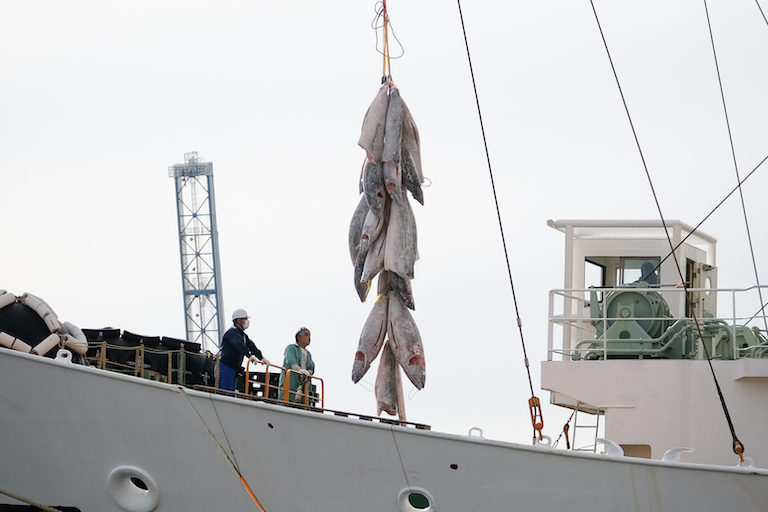
In December 2020, Japan passed a new law enabling it to more strictly regulate seafood product distribution in order to help prevent IUU seafood from reaching the market. However, the law is applied on a species-by-species basis, and so far the only imported fish species for which the law applies are squid, saury, mackerel and sardine. It does not cover tuna, shark finning or abuse of crew.
In a May 2022 joint statement, the Anti IUU Forum Japan and other organizations commended Japan’s recent law on IUU seafood and made recommendations for its further improvement, including to “increase the number of species covered by Japan’s import control scheme, such as tuna, eel, and other wild-caught and aquacultured species which are heavily consumed in Japan and at risk of IUU fishing.”
“When importing seafood,” they added, “implement additional checks to ensure that no human rights abuses have taken place during production and/or processing.”
Bigger than DOF
Labor abuses and illegal fishing aren’t limited to one company or one country’s fleet. DOF appears to have paused its activities since late 2020 amid major financial troubles — the company has been hit with numerous lawsuits in China over unpaid bills and loans — but there are indications it plans to resume operations. Even so, it’s conceivable that Japan’s tuna importers could still be buying fish from companies engaging in abuses.
Between March 2019 and November 2020, at least 23 Indonesian deckhands died on 16 fishing vessels belonging to seven different Chinese companies, according to our count of incidents surfacing mainly in news reports. In addition, reports by campaign groups such as Greenpeace and the Environmental Justice Foundation (EJF) on the distant-water tuna fishing industry have highlighted abuses and illegal activity that occurred on board a number of vessels belonging to Chinese, Taiwanese and South Korean companies. The EJF noted that 50% of Taiwanese vessels and nearly all Chinese vessels from which it interviewed crew members had engaged in shark finning during the interviewees’ time on board.
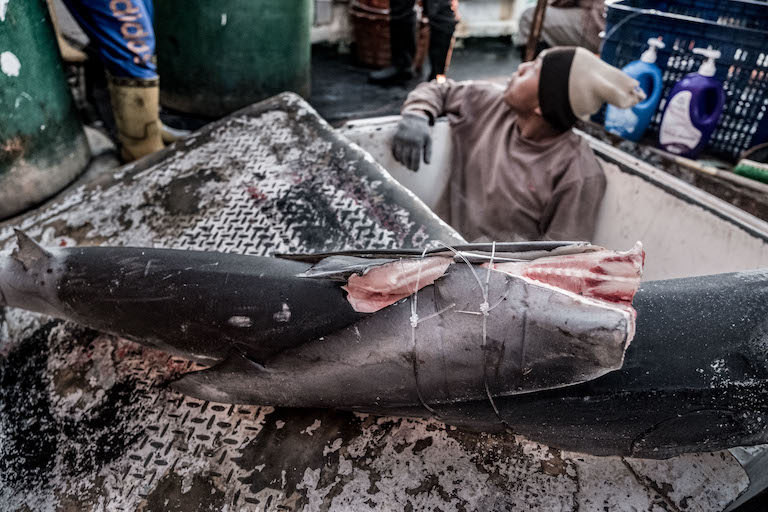
Vessel databases revealed that a number of the ships — or their sister vessels — flagged by the above NGOs and news stories had at-sea encounters with reefers bringing tuna to the Japanese market.
Although awareness is growing in Japan about abuses at sea and IUU fishing, and government and industry are beginning to implement changes, observers say there’s still much work to be done.
“In Japan, there have been few reports and no legal system to ensure transparency in the fishing industry,” wrote Japanese nonprofit Human Rights Now in July 2020, following news of the Long Xing 629 deaths. “As one of the world’s leading importers of seafood products, urgent action is required by the Japanese government and companies in the fishing industry.”
Annelise Giseburt is a freelance reporter based in Tokyo who previously worked for Tansa, an investigative reporting outlet in Japan.
Deckhand interviews by Basten Gokkon. Editing by Philip Jacobson and Rebecca Kessler.
Banner: Toyo Reizo trucks at Shimizu Port in Japan. Image by Tokyo Investigative Newsroom Tansa.
Citations:
Greenpeace. (2018). Misery at Sea: Human suffering in Taiwan’s distant water fishing fleet. Retrieved from https://www.greenpeace.org/static/planet4-aotearoa-stateless/2018/05/9fdf62aa-greenpeace_misery_at_sea-report-lowres.pdf
Greenpeace, & Serikat Buruh Migran Indonesia (SBMI). (2021). Forced Labour at Sea: The case of Indonesian migrant fishers. Retrieved from https://www.greenpeace.org/static/planet4-southeastasia-stateless/2021/05/ef65bfe1-greenpeace-2021-forced-labour-at-sea-digital_final.pdf
Environmental Justice Foundation. (2020). Illegal fishing and human rights abuses in the Taiwanese fishing fleet. Retrieved from https://ejfoundation.org/resources/downloads/Taiwan-briefing-IUU-HR-2020-July.pdf
This story first appeared on Mongabay
South Africa Today – Environment
This article is licensed under a Creative Commons Attribution-NoDerivatives 4.0 International License.
You may republish this article, so long as you credit the authors and Mongabay, and do not change the text. Please include a link back to the original article.



